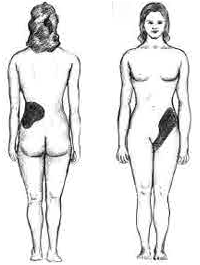Renal colic
Editor-In-Chief: Prab R Tumpati, MD
Obesity, Sleep & Internal medicine
Founder, WikiMD Wellnesspedia &
W8MD medical weight loss NYC and sleep center NYC
| Renal colic | |
|---|---|

| |
| Synonyms | N/A |
| Pronounce | N/A |
| Specialty | N/A |
| Symptoms | Severe flank pain, nausea, vomiting, hematuria |
| Complications | Urinary tract infection, hydronephrosis, kidney damage |
| Onset | Sudden |
| Duration | Variable, often hours to days |
| Types | N/A |
| Causes | Kidney stones |
| Risks | Dehydration, diet high in protein, family history |
| Diagnosis | Medical imaging (e.g., CT scan, ultrasound) |
| Differential diagnosis | Appendicitis, diverticulitis, ectopic pregnancy |
| Prevention | N/A |
| Treatment | Pain management, hydration, medical expulsive therapy |
| Medication | NSAIDs, opioids, alpha blockers |
| Prognosis | N/A |
| Frequency | Common |
| Deaths | Rare |
Renal colic is a type of pain experienced in the lower back or abdomen, typically caused by the presence of kidney stones in the urinary tract. This condition is characterized by severe, intermittent pain that can be debilitating.
Causes[edit | edit source]
Renal colic is primarily caused by the obstruction of the urinary tract by kidney stones, also known as nephrolithiasis. These stones can form due to various factors, including dehydration, dietary habits, genetic predisposition, and certain medical conditions such as hyperparathyroidism and gout.
Symptoms[edit | edit source]
The hallmark symptom of renal colic is intense pain that often starts suddenly and can fluctuate in intensity. The pain is usually felt in the lower back, side, or groin. Other symptoms may include:
- Hematuria (blood in the urine)
- Nausea and vomiting
- Dysuria (painful urination)
- Frequent urge to urinate
- Fever and chills (if an infection is present)
Diagnosis[edit | edit source]
Diagnosis of renal colic typically involves a combination of medical history, physical examination, and diagnostic tests. Common diagnostic methods include:
- Urinalysis to detect blood or infection
- Imaging studies such as ultrasound, CT scan, or X-ray to visualize the stones
- Blood tests to check for kidney function and other related parameters
Treatment[edit | edit source]
Treatment for renal colic aims to relieve pain and facilitate the passage of kidney stones. Options include:
- Pain management with medications such as NSAIDs or opioids
- Hydration therapy to help flush out the stones
- Medical expulsive therapy using medications like alpha-blockers to relax the muscles in the urinary tract
- Surgical intervention such as ureteroscopy, shock wave lithotripsy, or percutaneous nephrolithotomy for larger stones
Prevention[edit | edit source]
Preventive measures for renal colic focus on reducing the risk of kidney stone formation. These include:
- Staying well-hydrated
- Adopting a diet low in oxalates, sodium, and animal protein
- Managing underlying medical conditions
- Regular monitoring and follow-up with a healthcare provider
See also[edit | edit source]
References[edit | edit source]
External links[edit | edit source]
Search WikiMD
Ad.Tired of being Overweight? Try W8MD's physician weight loss program.
Semaglutide (Ozempic / Wegovy and Tirzepatide (Mounjaro / Zepbound) available.
Advertise on WikiMD
|
WikiMD's Wellness Encyclopedia |
| Let Food Be Thy Medicine Medicine Thy Food - Hippocrates |
Translate this page: - East Asian
中文,
日本,
한국어,
South Asian
हिन्दी,
தமிழ்,
తెలుగు,
Urdu,
ಕನ್ನಡ,
Southeast Asian
Indonesian,
Vietnamese,
Thai,
မြန်မာဘာသာ,
বাংলা
European
español,
Deutsch,
français,
Greek,
português do Brasil,
polski,
română,
русский,
Nederlands,
norsk,
svenska,
suomi,
Italian
Middle Eastern & African
عربى,
Turkish,
Persian,
Hebrew,
Afrikaans,
isiZulu,
Kiswahili,
Other
Bulgarian,
Hungarian,
Czech,
Swedish,
മലയാളം,
मराठी,
ਪੰਜਾਬੀ,
ગુજરાતી,
Portuguese,
Ukrainian
Medical Disclaimer: WikiMD is not a substitute for professional medical advice. The information on WikiMD is provided as an information resource only, may be incorrect, outdated or misleading, and is not to be used or relied on for any diagnostic or treatment purposes. Please consult your health care provider before making any healthcare decisions or for guidance about a specific medical condition. WikiMD expressly disclaims responsibility, and shall have no liability, for any damages, loss, injury, or liability whatsoever suffered as a result of your reliance on the information contained in this site. By visiting this site you agree to the foregoing terms and conditions, which may from time to time be changed or supplemented by WikiMD. If you do not agree to the foregoing terms and conditions, you should not enter or use this site. See full disclaimer.
Credits:Most images are courtesy of Wikimedia commons, and templates, categories Wikipedia, licensed under CC BY SA or similar.
Contributors: Prab R. Tumpati, MD

